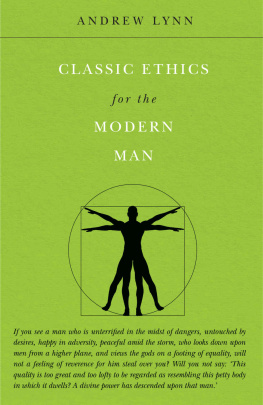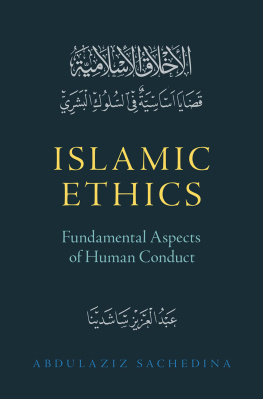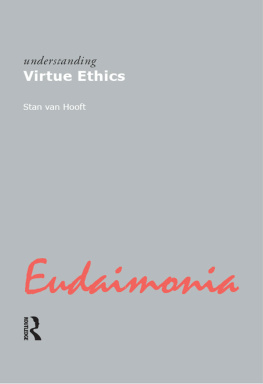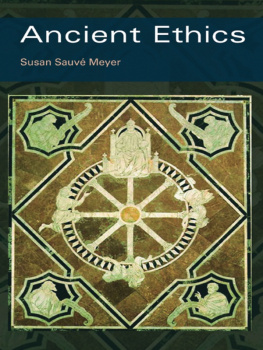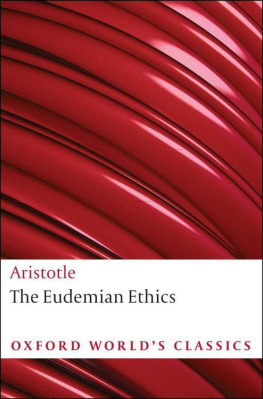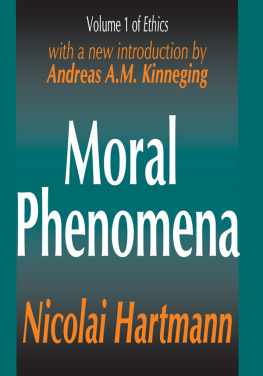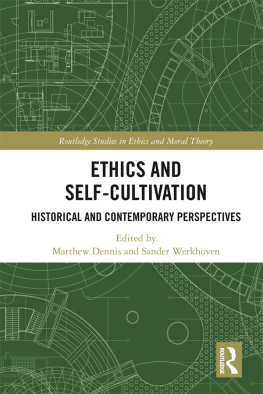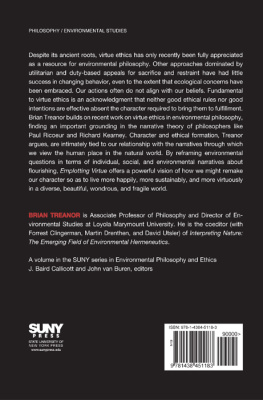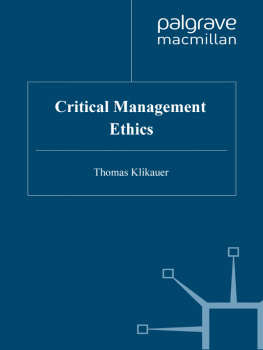All rights reserved. No part of this book may be reproduced, stored in a retrieval system, or transmitted, in any form or by any means, electronic, mechanical, photocopying, recording or otherwise, without the prior permission of the copyright owner.
Once upon a timeway back when the Western world, in the sportiveness of its youth, shook its honeyed locks and gazed out smilingly across the sun-speckled Mediterraneanethics was conceived to be, of its very nature, a healthy, life-affirming, and inherently joyous affair. In that age, as the philosophers strolled in the bustling agora or reclined in dappled olive groves, they spoke to one another of the good man as the man who had cultivated in his inner being the cardinal virtuesjustice, wisdom, courage, moderationand who, as a natural consequence, lived life well. A mans job was first and foremost to get himself in order, these philosophers unhesitatingly affirmed, for this was the path to the personal excellence that constituted virtue, and it was through virtuous, well-balanced, and self-disciplined men that the state could be turned into an agent of human flourishing rather than an instrument of tyranny and oppression.
The Westor something that goes by its namestumbles forward zombie-like to this day, but it has long been wracked by a moral sickness from within that renders it virtually unrecognisable from what it once was. In truth, the seeds of the disorder may have been there from the very beginning, blown many hundreds of years ago from the hardness of the desert, where the sun pounds mercilessly against the barren sands, into the heartlands of Europe, where they landed and took root in the soul of Western man. At first the thing seemed harmlessno more than a light delirium, which infected the mind and whispered, seductively, of a moral law that would be answerable to all mans doubts and misgivings. Bit by bit, however, the new dogma began to edge out the old wisdom, and the ancient virtues came to seem no longer quite so serviceable. What a struggle it was to live day-in, day-out, in pursuit of personal excellence! What a struggle to chase after the exquisite self-balance that seemed always to escape just beyond ones reach, like the horizon or the shimmering cusp of a rainbow! Let us speak instead, said Western man, not of virtue but of dutyand of a duty that, since it applies universally, applies to each of us equally. But as the years shaded into decades, and decades into centuries, human weakness took hold, and each man took to pointing his gnarled finger at the other to insist that the other was in the wrong. By now the mind-madness was complete: man was shrill and accusatory to the very same extent that he had become cretinous, dwarfish, and cloven-footed.
It is the underlying proposition of this book that what is commonly understood as ethics in the West has become dangerously one-sided. In the popular mind, the ethical life is to be lived by doing ones duty through acting in accordance with universalistic moral laws, and has little or nothing to do with cultivating a better self or in living the good life. This privileging of what is known as duty ethics over virtue ethics may seem to be nothing more than a quirk of intellectual or cultural history. In fact, the feverish pursuit of abstract moral universalism in place of an ethics of personal virtue has had profound consequences for the West.
First is the tendency towards moral posturing. When virtue corresponded to excellence, there was no place for this: what mattered was the crafting and cultivating of ones own charactersomething that could only with great difficulty be feigned. Once goodness was conceived of exclusively as adherence to a universal moral law, however, fakery became inevitable: for whereas ones character displays itself in the minutest of acts and in the face of the smallest of provocations, whether or not one abides by a rule is a matter of report and reputation. Two further co-morbidities, conformism and self-righteousness, follow naturally at its heels: conformism because the universality of the moral law is unlikely to be found, so it is thought, in the minority view; and self-righteousness because there is no easier way to associate oneself with the moral law than to be one of those shouting it out most loudly and most aggressively hunting down its infractors.
Second is the tendency to moralise what are in fact legitimate differences in views. When the virtuous life was conceived as the good life lived in pursuit of personal excellence, differences in the content of mens views were secondary. When morality is determined by the dictates of a universal moral law, however, divergence from the orthodoxy comes to be seen as divergence from the good itself, and therefore as a kind of deficiency or even active immorality. Put slightly differently, the former approach conceives of difference as difference; the latter, as wrongdoing, wickedness, and sin. This moralising tendency strikes at our ability to take a step back and discuss our differences with cool heads and steady hearts; it makes us tetchy, ill-tempered, and accusatory.
Third is the self-defeating quality of a moral code that neglects the ethical mandate to work first on oneself. To arrogate to oneself the moral high ground, without having first gone through the long slow process of building and refining ones inner nature, might sometimes receive the approbation of the state or the masses, but rarely does it inspire or engage the community more broadly. True respect cannot be commanded; it can only be earned. If you are slovenly, appetitive, ill-disciplined or weak, you have no reason to expect to be listened to, however loudly you may shout.
This book sets out, by introducing several of the most enduringly relevant of the classic texts, to bring some balance back to our understanding of what ethics can be. It presents a tradition that has, in fact, been with us all along, although perhaps hidden in plain sightfor virtue ethics, despite having been neglected for the better part of two centuries, has always been a fundamental part of the Western tradition. There is, as John Stuart Mill puts it, a Greek ideal of self-development deriving from a conception of humanity as having its nature bestowed on it for other purposes than to be merely abnegated; Pagan self-assertion, he adds, is one of the elements of human worth, as well as Christian self-denial. This ideal is, however, one that has at timesand perhaps in recent years more than everbeen overwhelmed by the urge for abstract moralism and self-abnegation. Now, as the West seems to cringe in embarrassment at its own achievements and as much as at its own sins, is time for the corrective that this book, in small part, attempts.
Classic Ethics for the Modern Man opens by examining what the ancient Greeks advocated in their virtue ethicsthe goals of personal excellence, inner harmony, and the pursuit of the good life through rational activity and contemplation. In selections from the Republic and Phaedo, Plato explores the idea of the good in his notion of the just man whose constituent elements of soul and body are rightly ordered in preparation for death. Aristotle, on the other hand, is this-worldly as always: for him, personal excellence is to be achieved by striving to realize the golden mean of conduct that is found at the mid-point between two vices; that is done, he explains in his

